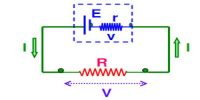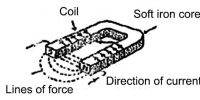Electrical energy is needed to produce the electric current in a circuit. The electromotive force of an electrical energy source is defined as the work done by the source or the energy spent by the source in driving a unit positive charge from one point of the circuit to the same point by traversing the complete circuit along with the source.
If the work is done is W J in bringing Q C of charge in a complete circuit, then the work done in bringing 1 C of charge is W/ Q.
Therefore the electromotive force of the source, E = W/Q
Unit: The SI unit of electromotive force is JC-1 or volt (V).
The devices which can transform some other forms of energy into electrical energy they only have electromotive force. For example cell, generator, etc. An electric cell converts chemical energy into electrical energy and a generator covert mechanical energy into electrical energy. The electromotive force of a cell is the sum of the potential differences which develops in different parts of the circuit along with the cell.













